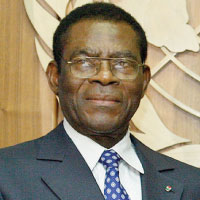(Trinidad Express) Foreign Affairs Minister Winston Dookeran said the Trinidad and Tobago Government was not in a position to adjudicate on international human rights reports on President of Equatorial Guinea Teodoro Obiang Nguema Mbasogo.
Mbasogo, who in his capacity as head of the ACP (African, Caribbean and Pacific) region, was one of three presidents invited to attend this week’s Caricom meeting in Port of Spain.
Human Rights Watch World Report 2012 reported that the government of Mbasogo, who is Africa’s longest serving ruler, “regularly engages in torture and arbitrary detention” of opponents.
Speaking on Monday at a news conference at Tower C, International Water-front Complex, Port of Spain, Dookeran said the issue of diplomacy is predicated on fundamental principles, and Trinidad and Tobago strove at all times to support these principles.
He said in his view, Equatorial Guinea was central to the ACP region, “which has a very important geopoliticial space in global dynamics”.

Pointing out that this country recently attended an ACP summit in Equatorial Guinea, Dookeran said: “It is an important geopolitical space, and we are trying to play our part in that space.”
On concerns about Mbasogo, Dookeran said Trinidad and Tobago was not in a position to adjudicate on such matters. It was not part of this country’s remit, he said.
Caricom secretary general ambassador Irwin La Rocque, also speaking at the news conference, said three heads of state were invited and there was confirmation from two—Venezuela President Nicolas Maduro and Dominican Republic President Danilo Medina.
La Rocque said Mbasogo may have some logistical issues getting to Trinidad and Tobago on time, but if he cannot come, he would be represented either by his vice-president (who is his son) or his prime minister.
La Rocque also revealed, in response to questions on the slow pace of implementation of the Caribbean Court of Justice (CCJ) as the region’s final court of appeal, that there might be two new signatories—Dominica and St Lucia.
He said Dominica had signalled to the UK’s Privy Council that it intended to take steps to allow its accession to the CCJ.
La Rocque said more recently, the Eastern Caribbean Court of Appeal had given advice to the government of St Lucia that it did not require a referendum before signing on to the CCJ.
He said this perhaps clears the way for any other Organisation of Eastern Caribbean States (OECS) country with a similar constitution to join the CCJ without the need for a referendum.
Dookeran, asked about whether the signing of SOFA (Status of Forces Agreement) with the United States would affect this country’s relationship with Venezuela, said the agreement was not intended to try and change the relationship with Venezuela.
Stressing there would be no military base here, Dookeran said the agreement was designed for the facilitation of security vessels.
He said the country welcomed President Maduro’s visit as the beginning of a new dialogue with Venezuela.





